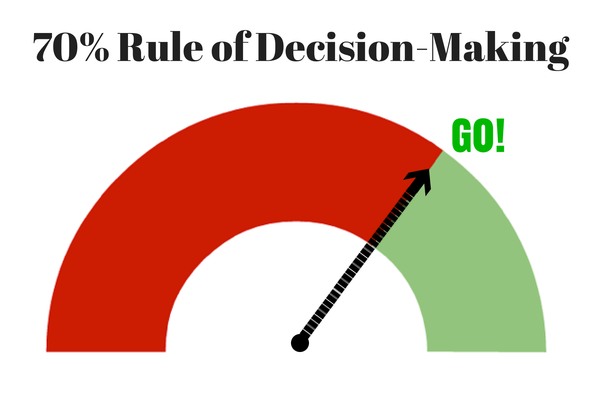 The time between intention and action can be unending.
The time between intention and action can be unending.
Whether it’s getting around to joining that gym or applying to a job — you can be in a zone of perpetual procrastination I call “yet” in which there’s lots of time “researching” on the internet. Whether it’s a trivial or life decision, when you get in this zone, you’re mostly left overwhelmed, tired, and discouraged — all before you’ve even started.
Louis C.K. is one of the most prolific comedians today, who also writes, edits, produces, and stars in his critically acclaimed TV show Louie. He credits the way he keeps moving forward to a system he came up with for avoiding analysis paralysis and this zone of yet.
He calls it his 70% rule of decision-making, and it kicks him into action when there’s that irresistible call to procrastinate that leads to opportunities slipping by.
Stop Procrastinating—Don’t Wait for 100% Readiness to Start
One of the biggest problems with acting on something is that we often feel like we have to be somehow “ready” to do it, with the best path and choice already in mind. This leads into a spiral of overthinking that moves the actual decision point further and further away because you lose direction, clarity, and motivation.
Starting is a huge part of the battle. So Louis’s rule is that “if you have someone or something that gets 70 percent approval, you just do it.”
By giving yourself this mental cutoff point for your thought-process being “under construction,” you give yourself the kick in the pants you need to stop procrastinating and wasting time just thinking about what you’re going to do. Having that 70% threshold is important, too, because that means your decision isn’t based totally on impulse and you’re exercising some control over your fate.
The handy effect of the 70% Rule is that merely applying it increases your motivation, because you become more satisfied with your choice and you’ve done the hardest thing of taking that first step. As Louis explains, “[H]ere’s what happens. The fact that other options go away immediately brings your choice to 80. Because the pain of deciding is over.”
The benefits continue as you start to work through it and gain experience. Louis explains the rest of the progression:
“When you get to 80 percent, you work. You apply your knowledge, and that gets you to 85 percent! And the thing itself, especially if it’s a human being, will always reveal itself—100 percent of the time!—to be more than you thought. And that will get you to 90 percent. After that, you’re stuck at 90, but who the fuck do you think you are, a god? You got to 90 percent? It’s incredible!”
The Choices that Jam Up Your Brain
The reason that a decision-making rule is so helpful is that choice can be debilitating. There’s even evidence that happiness increases when you deliberately limit the number of choices you consider.
Take the famous jam experiment by Sheena Iyengar, a social psychologist from Columbia University. Iyengar set up a booth at a fancy grocery story, switching between offering a range of 6 or 24 kinds of jam for customers to sample. While the larger display attracted 60% of shoppers to stop at the booth — it was the smaller set that got people to make a purchase. 30% of people who’d seen the smaller sample selection ended up buying a jar of jam versus the mere 3% who’d stopped by the larger set.
Even though people are attracted to having lots of options, too much choice is demotivating when it actually comes down to making a decision. It’s a situation that’s common to anyone who has stood in front a display at a grocery store, paralyzed by sheer yogurt.
Iyengar points out that your brain becomes overloaded with choice at some point, creating a challenge to even just deal with information, much less digest it properly. You start posing these almost impossible questions of mental math for yourself — “which one is best? which would be good for me?” — that puts on the brakes.
* * * * *
Choice is initially appealing and fun but ultimately can reduce motivation to the point where nothing happens — and the way we choose to spend our time is always vulnerable to this analysis paralysis.
The writer Oliver Burkeman, in explaining the value of moving away from goals towards a mentality of “see what happens,” puts it beautifully: “Uncertainty is where things happen. It is where the opportunities — for success, for happiness, for really living — are waiting.” Experience, gut feelings, and mental rules like Louis’s allow you to embrace that uncertainty with more confidence. Perfection, when it comes to conditions and choices, never presents itself so that all you have to do is step aboard and float to awesomeness.
Instead of always waiting around for certainty, go where the opportunities are waiting so that you can find your own way.
